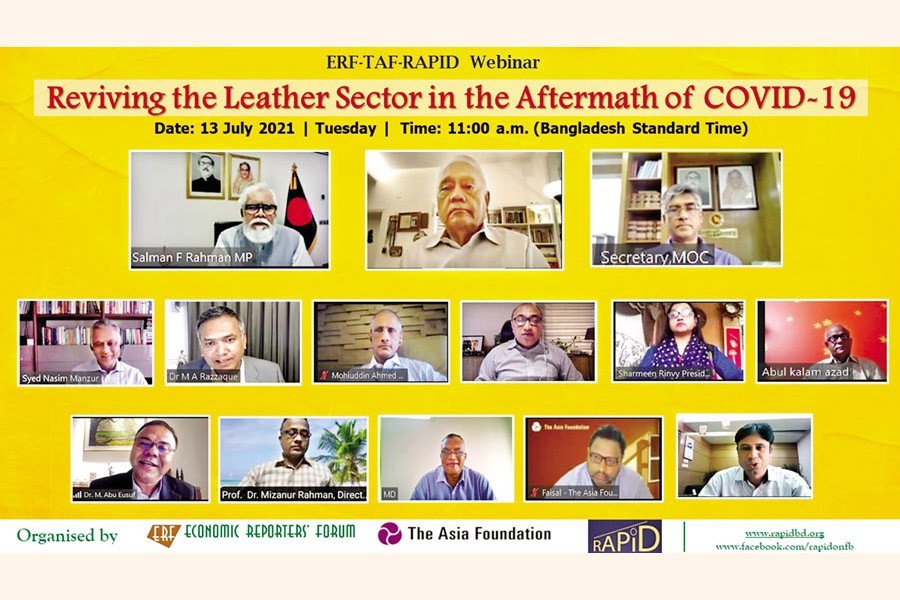No non-compliant industries will be allowed to market their products domestically, as the government has taken the compliance issues seriously, prime minister's private sector industry and investment advisor Salman F Rahman said.
Speaking as the chief guest at a webinar, he said the government decided to develop a special wing, like Accord and Alliance in the clothing sector, to look after compliance issues in the industries concentrating in domestic market.
They would also arrange long-term financing facilities for the industries regarding compliance issues, he told the virtual discussion, titled 'Reviving the leather sector in the aftermath of Covid-19'.
It was jointly hosted by the Economic Reporters' Forum (ERF), The Asia Foundation, and the Research and Policy Integration for Development (RAPID).
ERF general secretary S M Rashidul Islam moderated the discussion, where the businesses expressed their serious concern for not being able to fully operationalise the Savar Tannery Estate.
Citing the recent fire incident in a Narayanganj juice factory, Mr Rahman said international media covered the incident. It shattered the image of the country that successfully dealt with compliance issue in the RMG sector after the deadly Tazreen Fashions fire and Rana Plaza building collapse.
"Now the question is how we ensure compliance in those factories? We've talked with the FBCCI. We need to arrange a long-term financing mechanism for the industries. We will not allow products of the non-compliant factories in the market."
Talking about the central effluent treatment plant (CETP) in the Savar Tannery Estate, he said the design of the estate was not right.
He came down heavily on BUET as a consultant of the project, and said the engineering institute damaged the project with its (wrong) direction.
"We cannot destroy the infrastructure. We need to make reforms to make it (functional) as per the LWG standard."
Sharing his own initiative, the prime minister's adviser said he asked a reputed global company to take the responsibility for making the leather industrial estate compliant.
"The company has started working, and will make a presentation soon regarding what needs to be done there now," he added.
Speaking as a guest of honour, former caretaker government adviser Syed Manzur Elahi said they had been talking about the CETP since the early 90s, and too many seminars, meetings and discussions were held about it.
"This is 2021. I think the time has come for actions. A taskforce is (needed to be) formed with the stakeholders along with short- and medium-term plan of actions. The taskforce will set priorities of the actions to be executed."
Mr Elahi, also chairman of Apex Group, said the taskforce members would sit once a month to discuss the progress, and make each man of the special body accountable for his/her activities.
"We cannot resolve the problems overnight. We have to move step by step. We also have to keep in mind that 'no compliance, no business' - especially for the export-oriented ones," he opined.
Dr M A Razzaque, RAPID chairman, said the pandemic badly hit the leather and leather goods industries, as global trade fell by 10 per cent, whereas the leather and leather goods declined by 22 per cent.
The future challenges that the leather sector would be facing are - ensuring compliance and erosion of LDC preferences.
He noted that momentum of leather export growth must be seized now. There are opportunities, as many global leather companies are now moving out of China.
"We need to grab the opportunities, and efficient operation of the tannery estate must be of utmost priority," he added.
Managing director of Apex Footwear Ltd Syed Nasim Manzur said Bangladeshi leather export is recovering slowly, but it is still 1.65 per cent behind than that of the pre-pandemic time of 2019.
The travel restrictions due to the pandemic strongly impacted the leather sector with significantly reducing its demand locally and internationally. It also affected the CETP remediation process.
He mentioned that hike in logistics and shipping costs as well as delay came as another concerning issue. Shipping cost per container went up by three times.
Terming the leather sector an unpolished diamond, Mr Manzur said the global footwear market reached US$ 1.0 billion per day, and it is forecasted to reach $ 530 billion per annum year by 2027.
"So, we have huge opportunities. But the precondition is LWG compliance, and many buyers are watching Savar developments," he added.
The businesses and economists also requested the government to extend the same policy supports that the clothing sector is now enjoying - for ensuring a sustainable leather sector even in the post-LDC regime. The leather industry has all potentials to become another successful sector like RMG (ready-made garment).
Ministry of Commerce Secretary Tapan Kanti Ghosh, Chairman of Bangladesh Tanners Association Md Shaheen Ahmed, and RAPID Executive Director Dr Abu Eusuf, among others, also spoke at the event.


